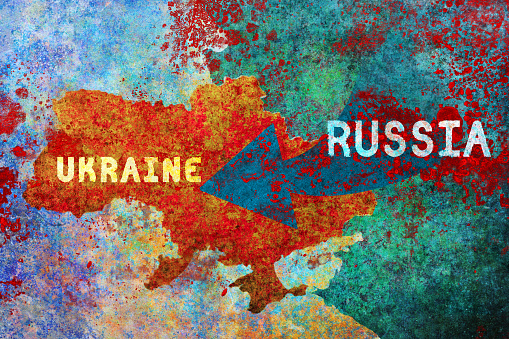It’s sometimes easy to feel sorry for the Russians. There’s something indescribably tragic about hapless conscripts huddled in ditches, resigned to death, or disgraced Air Force Generals seeking redemption in a hail of Stingers. The families shattered, the lives unlived. This is unhelpful, for, pathetic though they may appear, we cannot let our guard down. This war is far from over.
For all the excitement over last summer’s lightning Ukrainian advances, bringing talk of the restoration of Ukraine’s borders, the liberation of Crimea, the fall of Putin, peace on Earth, and the Second Coming, the front appears to have settled into an attritional stalemate. In a perversely gratifying manner, the Russians have done just as I predicted in my previous article. Their reversion to tried-and-tested human waves, backed by overwhelming artillery fire, poses a real threat.
Simply put, a nation of 40 million cannot hope to trade men with one of 145. Putin may only have mobilised 300,000 conscripts (incidentally, a cool quadruple the British Army), but there’s more where they came from. With no sign of major unrest at home, and renewed determination at the top, the outlook is stark. Maintaining relentless pressure with hardened Wagnerites, fresh-faced conscripts and scum dredged from the depths of the gulag archipelago, the Russians can chip away at Ukrainian formations while readying their elite armoured and airborne units to take the field once more.
The moment of maximum danger is fast approaching: the 24th of February, anniversary of the invasion, would be the ideal opportunity for Putin to escalate. A modestly successful spring offensive could easily become the trigger for total mobilisation. Putin’s expansionism is irrational; he will pursue it, whatever the cost. We in the West have fought limited wars, out of sight and mind, for so long that we forget its escalatory logic. Russia wins wars through persistence. Like that Soviet automaton in the best Rocky, against the Finns, the Germans, the Chechens they rolled with the punches, taking the blows squarely on the chin before battering the life out of their foe. If he does not back down, an all-encompassing national effort, bringing the full weight of Russian manpower and material to bear, is the natural conclusion.
What, then, is to be done? Only by attaining thorough qualitative supremacy can the Ukrainians hope to match Russia’s quantitative advantage. Fortunately, the West seems ready to help them down that road. Armoured fighting vehicles did, in fact, materialise, which I’ll admit was unexpected. Who’d have thought it, especially of the French?
The short-lived “tank debate” is immensely enlightening; like diffident children posed a simple question, each knowing the answer but all afraid of being caught out, the great nations of the West dawdled until one stepped forward. Only then did the dam burst, producing a veritable flood of offers. Shame beats acquiescence from even the most reluctant; even Germany, still traumatised by the last time they sent Panzers to Kiev, broke in less than a month.
Now comes furore over fighter jets. The Ukrainians want them, and again we hesitate. Here in Blighty, some claim that the Typhoon is unsuitable, that pilots will take too long to train, that maintaining the two or so dozen we could spare on a limited pool of parts would prove too difficult. If such sclerotic thinking predominated before the last war, ‘Darkest Hour’ would have ended with Gary Oldman‘s fatsuit pooling under the blazing arches of Westminster Abbey, Luftwaffe engines droning overhead. Besides, the mere intent would suffice, summoning forth squadrons of F-16s from across NATO. The kudos reaped would be immense.
Yet therein lies the problem. Like so much else today, much of this is performative, paling beside the sheer scale of the problem. The Russians fire more shells a day than Europe produces a month. The truth is that our latest offerings are more symbolic than tangible. The 130 or so main battle tanks pledged will be useful, a similar number of aircraft likewise. Neither will prove decisive. Unless the Russians prove preternaturally incompetent once again, the qualitative advantage we are offering is simply insufficient. Token gestures aside, a sustainable, permanent support system must be devised.
Naturally, there are limits to our charity. The real danger is that that sustaining Ukraine is weakening our already overstretched military. In one sense this is irrelevant; so long as the bulk of Putin’s forces remain tied down in Ukraine he is unlikely to go picking fights elsewhere. To confront NATO now would be an almost impressive act of national suicide. Retaliation would be swift, his demise certain. The Challies were designed to kill Russian tanks, the Typhoon to down their aircraft. In Ukraine they can do so, keeping the bear at bay while leaving our boys safe at home.
Nonetheless, we cannot allow our military to atrophy further; keep giving things away and soon there’ll be nothing left to give. Or for ourselves. This is not to say that we should look to our own safety, but that we must help ourselves to help them. We must seize this opportunity to reverse three decades of military decay. The issue is money, and, with taxes already sky-high, the solution, I’m afraid, is a bitter one. Swallowing our pride, we should look to our friends over the pond.
It’s all very well for the Americans to fret about our army no longer being ‘tier 1’; what will they do about it? With our mighty 3rd (UK) Division integrated into a US Army Corps, they have a real stake in the efficacy of our armed forces. We have gone practically everywhere they have. Unlike most of our continental allies, we even spend more than 2% of our GDP on defence – that it does not go far enough merely reflects the outsized commitment we shoulder. Naturally, we have differing national security perspectives, but it would be hard to find two nations whose priorities align more than ours. American largesse is legendary; they give away millions in military aid every year, much of it to regimes so corrupt they would make Blatter blush. Surely, to butcher the old tune, they could spare a brother a dime?
Of course, I’m not advocating grubby handouts, strings attached, but an international agreement, a lend-lease in reverse. Ideally, Sunak should pursue a three-sided deal – we train and equip the Ukrainians, they kill Russians on our behalf, and the Americans pay us to do so. Everyone benefits. The Ukrainians preserve their right to life, liberty and the pursuit of happiness, we get to re-equip our forces, and the Americans get a reliable expeditionary partner once more. With the most expensive generational hardware upgrades covered, our defence budget would go that much further, while the Ukrainians would actually receive viable quantities of kit. It’s a no-brainer, if the political will is there to do it.
We are at the 11th Hour. The Russians are in it to win it, and their victory, in three years or five, would bring to NATO’s borders a militarised pariah with unfinished business. A defeat would send them reeling back for a generation at least. A century hence no one will remember the mundanities of politics, the sordid machinations of finance. They will remember action taken in the face of peril, resolve in the face of terror, sacrifice in scarcity. If Sunak, Biden, Macron want to join Zelensky in the pantheon of political giants, they have but to act.






0 Comments